Understanding the Battle
July 10th, 2013 // 6:34 pm @ Oliver DeMille
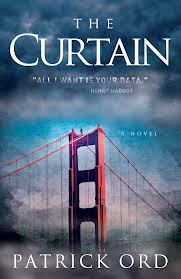 The following describes one side of the modern battle for our future:
The following describes one side of the modern battle for our future:
“You believe you can change the world for good, one person at a time. You prioritize your children and your neighbors above your own consumption.Fulfillment for you comes through love and service, not accumulation of material goods.”
And the next one describes how the other side of the battle attacks the good:
“I’d thought these ideas placed people like you in an emotionally vulnerable position. You strive for an ideal, and since people are inherently imperfect, they will ultimately let you down….
“I obscured the idea of intrinsic self worth by encouraging comparisons with other people—people who were unnaturally perfect because I made them up. I appealed to peoples’ egos as well as their insecurities by promoting the idea that it was not enough to be unique or to do good.
“My intent was to convince them that the only meaningful accomplishment was to be better than someone else. That got them more concerned with promoting a perception of goodness than with actually doing good.”
These profound words, from The Curtain by Patrick Ord (which is a great and fun read), provide a nutshell summary of what is wrong with our modern world and why freedom is in decline.
Let’s be clear.
It is essential to teach our children than being your unique self and doing good really is enough.
In fact, it is what life is all about.
Doing good. Serving others. Improving the world.
Nobody needs to be better than others, we all just need to be the best we can personally be.
We don’t need to be perfect, but we do need to lose our lives in doing good things.
We must never be distracted into promoting a perception of goodness.
We should put all our energy into actually doing good.
Not forcing good through government, but just getting to work helping the world become a better place.
These principles are simple and true.
But the future of freedom depends on most of us really believing and living them.
***********************************
 Oliver DeMille is the chairman of the Center for Social Leadership and co-creator of Thomas Jefferson Education.
Oliver DeMille is the chairman of the Center for Social Leadership and co-creator of Thomas Jefferson Education.
He is the author of A Thomas Jefferson Education: Teaching a Generation of Leaders for the 21st Century, and The Coming Aristocracy: Education & the Future of Freedom.
Oliver is dedicated to promoting freedom through leadership education. He and his wife Rachel are raising their eight children in Cedar City, Utah.
Category : Blog &Book Reviews &Citizenship &Featured &Government &Leadership &Producers &Service &Statesmanship
Losing Faith in Washington?
June 17th, 2013 // 12:07 pm @ Oliver DeMille
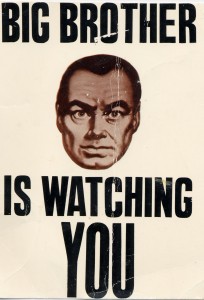 President Obama’s fundamental argument since his campaign and through his first term and second campaign has been that our society can benefit more from government than it has in the past.
President Obama’s fundamental argument since his campaign and through his first term and second campaign has been that our society can benefit more from government than it has in the past.
This is an easy sell in Europe, but not so much in the United States.
The framers mistrusted government, and felt that freedom can only last in a society where the people keep a close eye on all government activity.
But in the last few decades, many Americans have become used to increasing government benefits and programs.
The majority now votes for more government, not less.
Recent events have put a bit of a damper on the big government argument, however.
With scandals piling up like dominoes, from IRS targeting and Benghazi to AP phone records and PRISM to surveillance of Americans’ private emails and phone calls, the people are returning to a concern about Big Brother.
Even a number of strong supporters of the Obama Administration are calling for a new look at the current trajectory.
For example, Chris Matthews called on President Obama to take responsibility for his Administration’s actions, and the New York Times Editorial Board wrote: “The administration has now lost all credibility on this issue. Mr. Obama is proving the truism that the executive branch will use any power it is given and very likely abuse it.”
Both the Bush and Obama Administrations overreached their powers, and in fact such abuses go back to the Clinton, Bush I and earlier administrations.
In short, Washington is in some ways out of control, and our freedoms are at stake.
In the face of all these scandals, President Obama has told the American people that these are simply the normal “inconveniences” of keeping our nation safe.
Note that this is the argument used by many throughout history who wanted to increase the power of government over its people.
But there is a big difference between this round of scandals and those that have come in past decades.
Amazingly, the White House isn’t acting as if it is under siege.
As David Brooks wrote on June 6 in The New York Times:
“There’s a weird calm around Washington these days. The Obama administration only has a year before the lame-duck status sets in. Yet you don’t get a sense of urgency.
“White House officials seem busy running the government, but they are not filling the public space with a transformational second-term agenda. Republican leaders aren’t offering bold plans either.”
The current Administration has lost its credibility concerning its main purpose—to expand the role of government.
Still, many people really do want government to do more for them.
As long as the majority believes in ever-expanding government, it is going to endure scandals and keep electing leaders who will deliver.
***********************************
 Oliver DeMille is the chairman of the Center for Social Leadership and co-creator of Thomas Jefferson Education.
Oliver DeMille is the chairman of the Center for Social Leadership and co-creator of Thomas Jefferson Education.
He is the author of A Thomas Jefferson Education: Teaching a Generation of Leaders for the 21st Century, and The Coming Aristocracy: Education & the Future of Freedom.
Oliver is dedicated to promoting freedom through leadership education. He and his wife Rachel are raising their eight children in Cedar City, Utah.
Category : Blog &Current Events &Featured &Government &Leadership &Politics
A Funny Thing Happened on the Way to Big Government
June 17th, 2013 // 12:01 pm @ Oliver DeMille
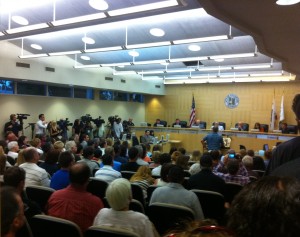 Local government is increasingly the place where things are getting done.
Local government is increasingly the place where things are getting done.
As the party system has created gridlock in Washington, less is getting accomplished on Capitol Hill.
In a funny way, this has created a situation that is more like the American Founding era than anything we’ve experienced in over a century—the real place to get things done in government is at the local and state levels.
The bad news is that Washington continues to spend, borrow, inflate the currency by printing money, and over-regulate in nearly every facet of modern life.
Its growth is slowed by partisan conflicts, but it hasn’t started shrinking.
Not by a long shot.
Another piece of bad news is that the national parties and their teams are pushing their agenda even more vigorously at the local levels.
This means that the party controlling the White House will have a much larger budget and ability to promote national goals in each city, county and state.
The good news is that regular people can have more influence and make more of a difference at the local and even state level.
Most citizens have long felt they can’t really do much to improve Washington—the national government is just too big, too far removed, too immune to change.
But at the local level it’s a different story.
People who really want to get involved can make a major impact on local government.
The key is consistency.
Those who keep at it will eventually learn how to be effective, and as they involve their friends and colleagues they can become a real force for good.
This system, with a lot of citizen involvement at the local level, is what the American founding fathers envisioned.
In a strange way, it is now becoming more of a reality.
As David Brooks wrote in The New York Times, “The happiest people these days are those who leave Washington and get elected mayor or governor. The most frustrated people are people who were mayor and governor and get elected in the Senate. They end each day knowing they were busy. They’re just not sure they accomplished anything.”
Local government is the new power center, and regular people who want to make a real difference can now do so at levels not seen for over a century.
Get involved.
It’s unclear how long this new reality will last, but for now there is a window of power for concerned citizens.
***********************************
 Oliver DeMille is the chairman of the Center for Social Leadership and co-creator of Thomas Jefferson Education.
Oliver DeMille is the chairman of the Center for Social Leadership and co-creator of Thomas Jefferson Education.
He is the author of A Thomas Jefferson Education: Teaching a Generation of Leaders for the 21st Century, and The Coming Aristocracy: Education & the Future of Freedom.
Oliver is dedicated to promoting freedom through leadership education. He and his wife Rachel are raising their eight children in Cedar City, Utah.
Category : Blog &Citizenship &Community &Constitution &Current Events &Featured &Government &Independents &Leadership &Liberty &Mini-Factories &Politics
What is Freedom?
June 17th, 2013 // 10:38 am @ Oliver DeMille
I frequently get asked something along the lines of, “Oliver, you talk a lot about freedom; but what, exactly, do you mean by the word ‘freedom?’ How do you define it?”
It’s a very good question. To answer it, I first want to define “liberty.” After all, the Declaration of Independence boldly affirms that among our inalienable rights are “…life, liberty, and the pursuit of happiness.”
Actually, the key word in this sentence is “inalienable,” and everyone should read the excellent article by Kyle Roberts on what this word really means.
Liberty and freedom are similar, but they are slightly distinct, and understanding them both is essential in a society that is losing its freedoms.
Liberty
As for “liberty,” I define it as “the right to do whatever a person wants as long as it doesn’t violate the inalienable rights of anyone else.” Of course, in order to exercise liberty, a person needs to know what inalienable rights are—otherwise, he won’t know whether or not he is violating them.
Thus knowledge and wisdom are required to maintain one’s liberty, because a person who violates somebody else’s inalienable rights naturally forfeits his own liberty. The extent of this forfeiture is equivalent to the depth of the violation—when this is applied well, it is called justice.
License
License, as opposed to liberty, is defined as “the prerogative to do whatever a person wants or is able to do.” Note that this has often been used in history as an excuse to plunder, force or otherwise violate the rights of others. Thus license and tyranny are nearly always connected—the tyrant is tyrannical precisely because he takes license as he wills, and the person who pursues license eventually exerts tyranny of some kind.
Sometimes people pick one of the inalienable rights and use it to define “liberty,” such as: “Liberty is the right to do whatever a person wants as long as it doesn’t violate the property of another. Or … the life of another, etc. The problem with this type of definition is that though it is often accurate, it is also too limited. The violation of any inalienable right takes away one’s liberty.
Now that we have a definition of “liberty,” we can also define and compare the meaning of “freedom”:
Liberty: The right to do whatever a person wants as long as it doesn’t violate the inalienable rights of anyone else.
Freedom: A societal arrangement that guarantees the right of each person to do whatever he/she wants as long as it doesn’t violate the inalienable rights of anyone else.
“Liberty” comes from the Latin root liber though the French liberte, meaning “free will, freedom to do as one chooses … absence of restraint” (Online Etymology Dictionary). In contrast, the word “freedom” was rooted in the Old English freodom, which meant “state of free will; charter, emancipation, deliverance” (ibid). Thus liberty could exist with or also without government, but freedom was usually a widespread societal system that required some authority to maintain it.
In most eras of history, the goal is liberty, but it is almost never maintained without freedom. In other words, it is possible to have liberty without freedom, but in such cases it seldom lasts very long and it is usually only enjoyed by a limited few.
When freedom is present, however, liberty exists for all who don’t violate the inalienable rights of others.
What About Now?
This trip down memory lane has an important current application. A lot of people want liberty; in fact, nearly everyone desires liberty. But the only duty of liberty is to honor the inalienable rights of everyone else, and as a result liberty without freedom is fleeting.
In contrast, freedom requires many more duties, and therefore it musters much more from its people. It only succeeds when the large majority of people in a society voluntarily fulfill many duties that keep the whole civilization free.
To repeat: those who stand for freedom must honor the inalienable rights of all, and they must also take responsibility for standing up and helping ensure that society succeeds. No truly free government directs this free and voluntary behavior, but without it freedom decreases.
For example, one of the duties of those who support freedom is free enterprise—to take action that improves the society and makes it better. No government should penalize a person who does not do this (such penalties would reduce freedom), but overall freedom will decrease if a person has the potential to take great enterprises that improve the world, but doesn’t.
Thus freedom is very demanding. If people don’t voluntarily do good things, and great things, freedom declines. If they don’t exert their will and take risks to improve the world, freedom stagnates and decreases.
Freedom and Morality
Another way that people voluntarily increase freedom is by choosing morality. In societies where a lot of the people don’t choose a moral life, liberty may be maintained by some people but the freedom of all people eventually declines. When more people choose the path of virtuous living, freedom grows.
The same is true of charity and service. When more people choose it, freedom increases. There are a number of other ways people can voluntarily take actions that have a direct and positive impact on freedom. In the freest societies, a lot of the people choose to engage in many such behaviors.
When we pledge allegiance to the flag, we do so to promote “…liberty and justice for all.” This is the role of government—liberty and justice, or in other words the protection of inalienable rights and the providing of recompense if such rights are violated.
But while in free nations government is limited to this role, the people in a free society must do much more. If they all do their best, fully living up to their potential, freedom greatly increases.
In other words, the real question isn’t “What is freedom?” but rather “What is my role in freedom?”
The answer is different for each person, but the key is to not worry about how other people use their freedom. As long as they aren’t violating inalienable rights, they won’t hurt you. Your focus (and my focus, and each individual’s focus) should be, simply, “Am I living up to my full potential, my great life mission and purpose in this world?”
If your answer to this question is “yes,” you are a promoter of freedom and your efforts and projects will help increase freedom for everyone. If not, now is the time to get started…
Category : event &Featured &Foreign Affairs &Information Age &Liberty &Mini-Factories &Mission &Politics &Statesmanship &Technology &Tribes
Summer Reading for YOU
June 14th, 2013 // 10:56 am @ Oliver DeMille
5 Recommended Books for the Summer
by Oliver DeMille
“Dad, can you read to me more?” Meri asked me.
Surprised, I looked up from my book and responded, “Oh, sure.”
I took the book she was reading and read a chapter aloud to her. When I finished, I handed her the book.
“Thanks, Dad,” she said. “I could have read it myself, but I just love it when you read. I mean, in the winter you read to us a lot, and with all our classes and other activities it seems like I learn a lot from you, and all my other teachers.
“In the summer is when Mom reads to us the most, out on the couch on the porch, but I don’t learn as much from other people, and it seems like you don’t read to us as often.”
Meri walked away with her book, but our little conversation got me thinking. I’ve always taught that winter is the key time for family reading. But I think that summer is the most important time for kids to see their parents reading—mainly because they tend to spend less time on official “schooling” activities and more relaxed time with parents (and observing their parents’ leisure activity choices) during the summer months.
When children and youth see their parents reading a lot, they naturally value reading. When children and youth value reading, they read more.
Our choices during summer to make a huge difference in the education of our kids, and one of the most impactful things a parent can do is set the example of reading. If your kids see you reading books a lot, especially during summer leisure, not only are you filling your bucket of ideas and resources, but the example you set can drastically influence them. Reading is powerful!
On the national scale, all free societies are reading societies, and reading starts in the home!
Here’s a great summer reading list* that I’m following. I’m making sure all my children and youth see me reading these books this summer. And I’m really going deep—by reading with a highlighter and pen, taking notes and marking quotes as I go. I’m sharing these books because I hope you’ll do the same:
The Early History of Rome, by Livy
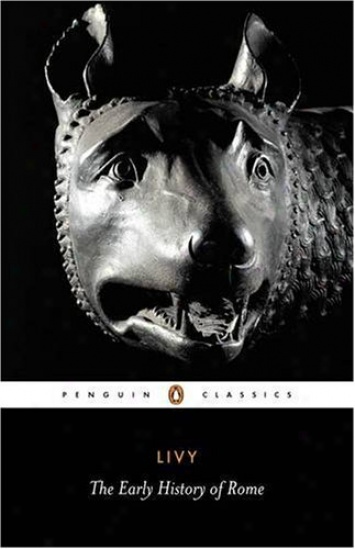 This great book isn’t part of the Great Books of Western Civilization, but it could be. I want my children and youth to see that I care about history, and I’ll look for opportunities to share Livy’s stories with them and talk about the connection between reading history and being successful leaders in life.
This great book isn’t part of the Great Books of Western Civilization, but it could be. I want my children and youth to see that I care about history, and I’ll look for opportunities to share Livy’s stories with them and talk about the connection between reading history and being successful leaders in life.
Rascal, by Chris Brady
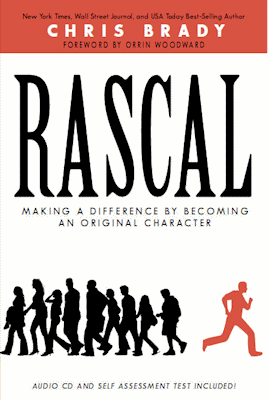 I want my kids to know what a “rascal” is–at least the way Brady defines it. I want them to be the kind of people this book promotes, and I can’t wait for them to ask me about this book.
I want my kids to know what a “rascal” is–at least the way Brady defines it. I want them to be the kind of people this book promotes, and I can’t wait for them to ask me about this book.
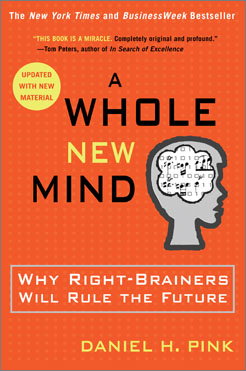 A Whole New Mind, by Daniel Pink
A Whole New Mind, by Daniel Pink
I want my youth to be innovative, creative, and have initiative. This is one of the hardest things to teach, but I’ll look for opportunities to discuss these things as I read this book.
Isaiah, in the Bible
I love sharing scriptural verses with the kids and discussing the meanings and lessons. It leads to a lot of important conversations with the kids about the most important topics.
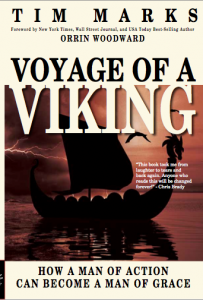 Voyage of a Viking, by Tim Marks
Voyage of a Viking, by Tim Marks
I can’t wait to talk to my kids and youth about this book! It’s about seeking for greatness, learning from your mistakes, not settling for mediocrity, and constantly improving yourself. I know the title of this book will have all my kids asking me questions about it!
Chillin’ and Grillin’
This week I’ve been reading these books in the evenings outside by the grill and the court where the kids play basketball, in the hot afternoons near the swamp cooler, and in the kitchen before meals and during cleanup after the family eats. I’ve taken turns with each book, so I’m a few chapters into all five of them, but I’ve had more than one discussion about each with the kids.
Tonight as dinner started, I got everyone’s attention and said, “I’m reading this awesome book. Actually, I’ve read it before but I’m re-reading it and I want to share something from it that really touched me.”
Everyone quieted down and listened. “Here goes,” I said. Then I read from Voyage of a Viking:
Kids can be pretty relentless in teasing one another, and the kids in my school were no different. I had never before been the subject of teasing and bullying, so it was a new experience for me. You see, news of my parents’ divorce got around town pretty quickly, and it wasn’t too long before the news hit my schoolyard.
The little kids in the family were leaning forward at full attention, and even the teens were paying close attention. I kept reading:
And then the teasing began. ‘There’s Tim, and he doesn’t have a dad,’ the kids would whisper to each other and taunt me.
I stopped reading and asked, “How would that make you feel?”
“I’d hate it!” Meri said forcefully. The other kids agreed.
After they shared their feelings, I asked, “Have you ever been teased like that?” We discussed this for a while, then I asked everyone, “Okay, I have another question. Have you ever teased anyone this way?”
“No way!” Meri exclaimed. She is nothing if not earnest.
“Are you sure?” I asked slowly.
Everyone considered. “Well, actually,” Meri said, then she told several stories of when she wasn’t very nice to people in her life. The other kids shared too, and we had a great conversation about being good friends and also standing up against bullying even when the victim isn’t your friend.
When I read what happened next in the book, everyone got even more interested. You’ve got to read it to get it! We spent dinner talking about this and discussing it.
At the end, I said, “I’m so excited to read the rest of this book.”
“Me too,” America said emphatically. “Meri” is nine years old, and she loves to read. I don’t know when she’ll read Voyage of a Viking, but I’ll be sharing from it and the others on my list all summer.
Actually, I’m having a hard time reading it because after our dinner discussion my visiting twenty-year old daughter Sara borrowed my copy and is reading it. Oh well, she reads fast. In the meantime, I’ve got the other four books.
Tomorrow at breakfast I’m planning to share the following quote from Livy, where he says that he is excited to write about Rome because, as he puts it:
I shall be able to turn my eyes from the troubles which for so long have tormented the modern world.
I’ll ask the family, “Why do you think people always feel that the modern, current world is so chaotic and hard and that the people in history somehow had things more simple? I mean, Livy thought this clear back in the time of Jesus Christ.”
This question is more for the teenagers, while yesterday’s conversation was perhaps more accessible to the younger kids. But everyone takes part in all of it. The older ones (me included!) bear reminding about Core Phase issues, and the younger ones benefit immensely by being including in the discussion of “serious” topics of academic and intellectual interest.
I could go on and on sharing examples of how to do this, but I’ve got a book calling to me. I’ve finished work for the day, and I want to read in the yard this evening—so I’ll be near the kids and we can talk.
Maybe I’ll teach them from one of these five books I’m reading, or maybe Meri will bring me a book of her own to read and talk about. Or perhaps we’ll all just sit in the warm evening and watch the sunset and talk. I often have the stack of all five books around with me, so I can just pick and choose which to read and share.
In any case, I’m excited to keep reading and sharing my book list this summer. This first week has been great. I can’t wait to see what we’ll learn about together in the months ahead.
Summer is a great time for education. So just get out your books, start reading, and share! The impact on freedom is huge.
Also check out Summer Reading for Kids >>
*Most of these books are available at your local library. Or, check the affiliate links to see amazon reviews, etc.
Category : Blog &Book Reviews &Business &Citizenship &Culture &Education &Family &Generations &Independents &Leadership &Liberty &Mission &Statesmanship











